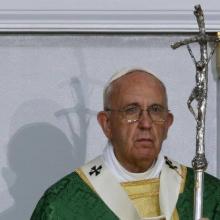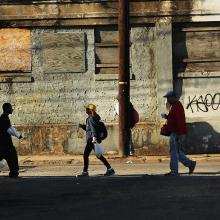camden
A New Jersey teen pleaded guilty to attempting to provide material support to terrorists, in what media called an ISIS-inspired effort to kill Pope Francis in 2015 during a public Mass in Philadelphia, according to a statement by federal prosecutors.
For the better part of 50 years, when I thought about Camden, N.J. — if I thought about the city at all — I’d envision driving as quickly as possible through a blighted urban wasteland to get across the Ben Franklin Bridge into Philadelphia.
I didn’t envision young people building boats in a deconsecrated church, or designing websites in a beautifully remodeled house whose walls are covered with original art, or being guided by caring adults through the traumas they’ve experienced and into health, wholeness, and academic achievement.
What a gift, then, to be reintroduced to the city through ministries that bring Camden’s human vitality to the surface, where it shines far above the daunting statistics upon which the city’s troubled reputation is built.

Image via Christian Mueller/Shutterstock.com
If we who are Christians participate in the political process and in the public discourse as we are called to do — the New Testament tells us that we are to participate in the life of the polis, in the life of our society — the principle on which Christians must vote is the principle, Does this look like love of neighbor? If it does, we do it; if it doesn’t, we don’t.
We evaluate candidates based on that. We evaluate public policy based on that. And that has nothing to do with whether you’re a Republican or a Democrat, liberal or conservative. It has to do with if you say you’re a follower of Jesus, then you enter the public sphere based on the principle of love which is seeking the good and the welfare of the “other.” That’s a game-changer.
OUR BODIES AND the land are one. Move the earth with your body, dance on it, farm in it, play with it; our final return to it is sacred. The soil is made of clay, like you and me—hydrocarbon molecules, layers of geological and muscular formations, alive. The soil, mountains, and valleys are layered with time like our layered muscle tissue. We dance on the earth in the face of death, for the healing of ourselves and the healing of the land, connected as farmers, dancers, painters, musicians, and lovers of the goodness of the good green earth moving through lament. Our bodies and the earth are one and their healing and grieving are interconnected.
January 2011, around the corner from my house, Anjaneah Williams was murdered, across the street from Sacred Heart Church, pierced in the side, at 2 p.m., walking out from a sandwich shop. It was a Thursday. She died six hours later at Cooper Hospital in the arms of her mother, before the children who deeply loved her. One of the gunman’s stray bullets shot across the street through the stained glass at Sacred Heart. Anjaneah’s death reverberated in the air, an exploding, echoing canyon; a screaming mother in a vacuum, unheard and deafening. Her murder was one of 40 in the neighborhood in the near half-century since the shipyard closed. Forty people on the sidewalks, on the lots where houses once stood, in a neighborhood with 28 known environmentally contaminated sites.
SOME BOOKS MAKE you want to sit down with the author on a sunny afternoon for a nice cup of tea. You would be excited to talk about how the book resonated with your own journey. For me, From Willow Creek to Sacred Heart: Rekindling My Love for Catholicism, by Chris Haw, is such a book.
Haw, a young, passionate, and deeply self-reflective theologian, shares his spiritual memoir. Part one recounts Haw's faith journey from a childhood as a lukewarm Catholic to teenage years at the evangelical megachurch Willow Creek, to college—including brief but powerful months in Belize, as well as days of protest against the Iraq war—and eventually to his present life in the apocalyptic landscape of Camden, N.J., where he returned to the Catholic Church.
Part two presents Haw's theological reflections on a variety of questions he has raised along his journey. He also focuses on common objections against the Catholic Church, such as the nature of the Mass as a sacrifice, the church's reliance on human tradition over the Bible, its hierarchical system, alleged ritualism, embellished architecture and ornaments, devastating scandals—including child molestation—and so on. Haw explores such challenging issues thoughtfully and courageously, while humbly accepting that he still struggles with them. Despite it all, Haw longs to see beauty and hope furthered through the Catholic Church.
I am a Catholic convert. I was raised in a Methodist family and trained in Protestant seminaries. By the time I decided to convert to Catholicism, I was starting my first year in the doctoral program of theological studies at Emory University. Feminist theology played a central role in both my theological education and spiritual formation, and it continues to today.
I recently heard that the state of New Jersey plans to evict the Camden Children's Garden from its 14-year-old home.
I don't know if you know much about Camden, N.J., but it's one of the cities in our country that wrestles with a myriad of social issues. There are a number of incredible people there that work tirelessly to improve the living and social conditions. Mission Year has spent a number of years living and working beside neighbors and friends in this city. The people there are very committed to things like improving housing, education, and tackling food desert issues, and they have very little resources with which to work.


